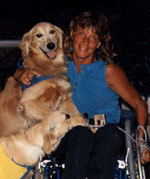An Education In Disabilities
by Jill Jorden Spitz
After 30 years of averted eyes and flustered responses, Janet Severt has come to accept it. She's intimidating. It's not a gruff personality or a jaw-dropping appearance that make people nervous when they're around her. It's her wheelchair. "People are afraid," Severt said. "They wonder, what do I do? How do I handle it? They don't know what's right and what's wrong."
That's where Opening Doors® comes in. The Woodford, Va., company, founded in 1989 by a disabled man who uses a wheelchair and his parents, teaches service workers how to service customers with disabilities of sight, hearing and mobility. Company representatives - including Severt, who is so taken with the Opening Doors® message that she signed on as a trainer - were in Central Florida for an all-day workshop directed at hotel employees.
W. C. Duke Associates Inc., the company that produces Opening Doors® seminars, also trains workers in the retail, grocery, banking and quick-serve businesses such as fast-food restaurants. Participants in last week's hospitality seminar at the Holiday Inn Sunspree in Orlando included executives from local hotels and tourist attractions.
Workers practiced the right and wrong way to deal with disabled people and used props to experience what it's like to be blind, deaf or in a wheelchair. They also learned Opening Doors' Ten Commandments of Disability Etiquette. For example, ask the disabled person if there's anything you can do to help. If you can't understand what someone says, it's OK to ask for it to be repeated. Ask before you push a wheelchair or grab an arm.
"A lot of this is common sense," Severt said. "It's the kind of thing that can make someone's stay at your hotel wonderful or miserable." She should know. During her 30 years in a wheelchair, Severt has been stared at, shouted at like she's deaf, led around like she's blind and - worst of all - flat-out ignored.
During a recent out-of-town speaking engagement, for example, she received no acknowledgment from a hotel clerk, she said. Despite repeated requests, the woman would speak only to Severt's able-bodied companion, who was forced into the uncomfortable position of passing messages back and forth.
Stories like that don't surprise Opening Doors® co-founder Cheryl Duke, whose son, Paul, was diagnosed with muscular dystrophy at age 6 and now is dependent on a wheelchair and a respirator. "Just when you've seen the height of human insensitivity," she said, "someone comes along and takes it to another level."
Putting an end to that sort of behavior isn't just good public relations, Duke said. It's the logical next step to following the Americans With Disabilities Act. The federal law requires public places and stores to offer accessible parking and entry and bathrooms for people with disabilities, or to provide services for those not able to gain access to the buildings.
Beyond that, offering better service to disabled guests is good business, Duke said. "The companies making this commitment are finding out this is a hot new market," Duke said.


